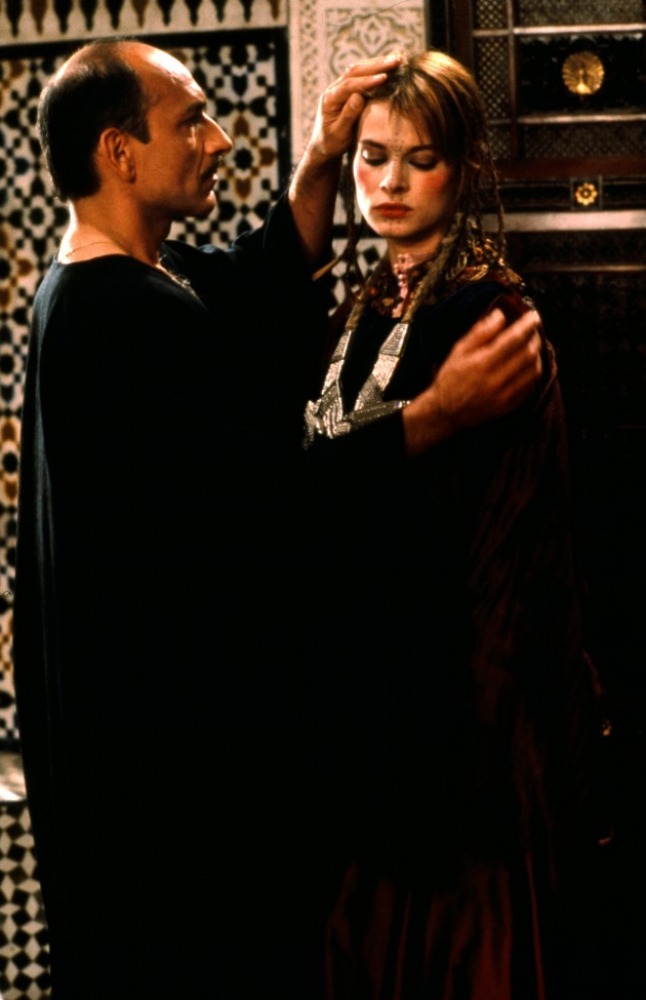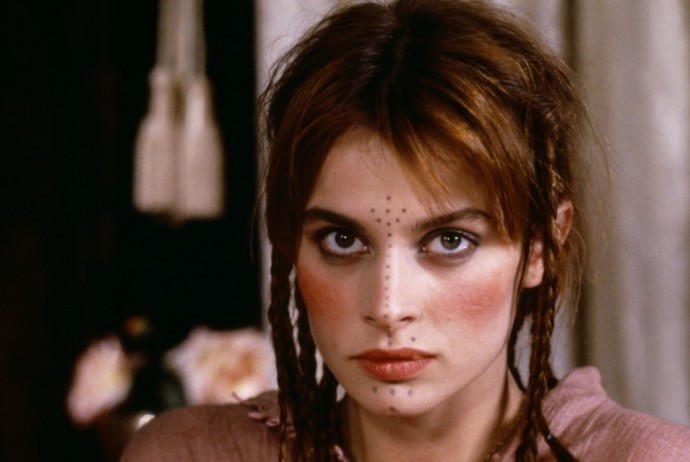Dir: Arthur Joffé
Star: Nastassja Kinski, Ben Kingsley, Dennis Goldson, Michel Robin
This is a rather odd film, which starts off playing like a modern update of those “white slavery” films, which go back about a century ago, to titles such as Traffic in Souls. Though the specifics e.g. the villain may have varied over the years, the common theme was that they all saw the ‘nice girl’ heroine abducted and forced against her will – if not, one sensed, that of the viewing audience – into a sordid life of sexual debasement. Here, it’s stock trader Diane (Kinski), who enjoys sex with a casualness befitting an era when AIDS was barely on the radar. However, a missed boat leads to her accepting a drugged cup of tea, and she wakes up to find herself the only white occupant of a harem somewhere in the Middle East.
An escape attempt only proves to show how utterly remote and hopeless her situation is, and she resigns herself to life as the plaything of a depraved sheik. Only, that’s not quite the case. For Selim (Kingsley) turns out to be charming and all but disinterested in the large number of women hanging about elsewhere in his palace – as he explains, some of them are relations, others were handed down from his father, and to be honest, he more or less only keeps the harem running because it’s traditional for someone in his position. Selim is kinda big on tradition, but is torn between that and modernization: he video conferences, but he also practices falconry. It’s that contradiction which at the heart of things, and gradually Diane finds herself realizing Selim can offer her more than the meaningless sex she had in New York: companionship.
 So, the moral of the story is, it’s perfectly alright to drug and abduct a woman that takes your fancy, because if you’re nice to her, she’ll end up falling in love with you – though “Stockholm syndrome” would perhaps seem a more credible explanation. Man, I’d have got laid so much, if only I’d known that in the eighties. Okay: known that, and also been a Middle Eastern potentate with apparently unlimited resources. Of course, Middle Eastern is kinda relative too, since Ben Kingsley was born in Yorkshire. I was going to get all snarky about Kingsley playing this in brownface, but I then discovered Kingsley is actually half-Indian, and was born Krishna Pandit Bhanji. Certainly makes him playing Gandhi a bit more acceptable, even if there’s still some distance between there, and the oil-rich kingdom inhabited by Selim.
So, the moral of the story is, it’s perfectly alright to drug and abduct a woman that takes your fancy, because if you’re nice to her, she’ll end up falling in love with you – though “Stockholm syndrome” would perhaps seem a more credible explanation. Man, I’d have got laid so much, if only I’d known that in the eighties. Okay: known that, and also been a Middle Eastern potentate with apparently unlimited resources. Of course, Middle Eastern is kinda relative too, since Ben Kingsley was born in Yorkshire. I was going to get all snarky about Kingsley playing this in brownface, but I then discovered Kingsley is actually half-Indian, and was born Krishna Pandit Bhanji. Certainly makes him playing Gandhi a bit more acceptable, even if there’s still some distance between there, and the oil-rich kingdom inhabited by Selim.
It’s another of his Oscar-nominated roles which I found more of a problem. Every time Selim opened his mouth, I expected to hear the broken-glass voice of Don Logan from Sexy Beast, berating Diane for making him “look a right cunt.” Not Harem‘s issue, of course, but that role is Ben Kingsley to me, and colors everything else in which I see him, whether made after or (in this case, 15 years) before. [And as an aside, just to confuse matters, the following year, there was a TV movie of exactly the same title, starring Omar Sharif. Albeit set in Victorian times, it’s also about a Western girl getting kidnapped, and her subsequent relationship with an Arab lord. Yeah, that’s 1.39 Gb of bandwidth I’ll never get back…]
I’m just not very sure what the point of this is. There is certainly not much in the way of chemistry between Kinski and Kingsley. who are rarely even slightly convincing as a couple. As mentioned, the culture clash between old and new, is referenced frequently, and indeed, is what leads the eventual downfall of Selim and Diana’s love-affair. A visiting oil-worker spots Diana, and reports her presence to the American embassy, causing enough of an international incident that the couple must split up. However, that’s just the start of things: funnily enough, allowing Western blue-collar workers to know you’ve got a harem, then heading off for a few days at a hotel, is not the wisest of moves. Salem returns to find the kids have broken into the liquor cabinet, so to speak, and things go south from there. So is that the moral here? It’s best to keep quiet, if you have large quantities of fertile women locked up in your basement?
There’s no denying, it’s nicely photographed, the other technical aspects are good (the soundtrack by Phillipe Sarde was particularly well-crafted), and both Kingsley and Kinski give decent performances. Nastassja has the more significant character arc, going from an independent-minded single woman in the big city, to one face in a crowd of potential bed-mates for Salem, but then reclaiming her individuality and forming a relationship which is probably the equal of anything she had in New York. But I still have moral qualms about whether that end actually justifies the means used by Selim, and the film has no real interest in this question. I guess the way it ends could be seen as providing some divine retribution for his sins – or alternatively, a lesson that certain people should not be given guns.
I suppose, in the end, the film is a role-reversal of sorts, deliberately playing against type. Contrary to the old white slavery films mentioned in the intro, the life to which Diane gets whisked away, is much less sexual then the one in which she was initially comfortable. And far from the archetypal sheik of Rudolf Valentino, Kingsley is almost painfully shy around women. However, it’s a perilously thin conceit on which to hang a film, and my attention was wandering off through the desert for much of the second half, in much the same way Diane was during the first.

